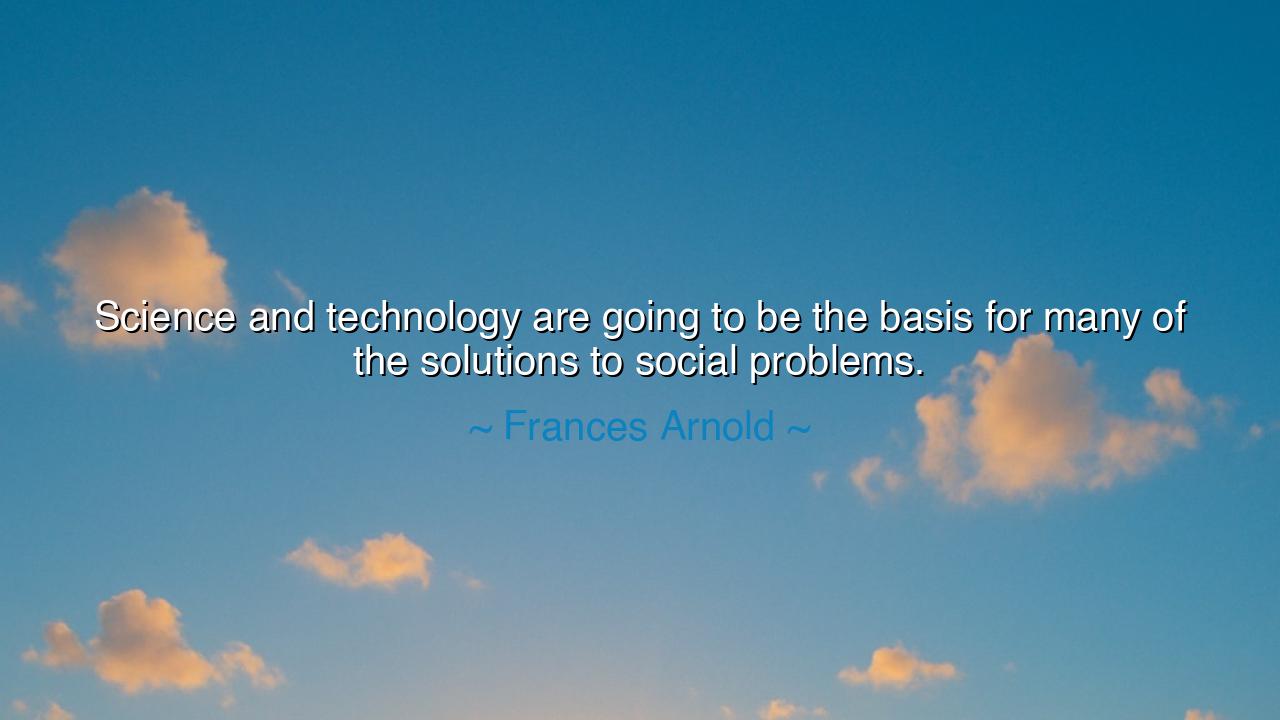
Science and technology are going to be the basis for many of the
Science and technology are going to be the basis for many of the solutions to social problems.






"Science and technology are going to be the basis for many of the solutions to social problems," these words, spoken by the brilliant Frances Arnold, shine forth like a beacon in the darkness, guiding those who seek not only knowledge but also the power to uplift and heal. In this single utterance, there is a promise—an invitation—to envision a world where science and technology are not distant gods to be feared or revered in isolation, but rather powerful allies, wielded by humankind to address the most pressing needs of society. They are tools, sacred in their potential, that can shape the world and transform suffering into hope.
Let us look back to the ancient times when the first spark of fire was harnessed by early humans, a discovery that carried with it the promise of warmth in the cold, light in the darkness, and the power to shape the very world around them. These early technologies, though simple by our standards, were the foundation stones upon which civilizations rose and flourished. The wheel gave movement to chariots and carts; the plow fed generations; and the writing system enabled knowledge to be passed from one to another, thus igniting the flame of science. It was these early breakthroughs, humble though they may have seemed, that forged the path for humanity’s ascendancy. Without them, we would not have the towering cities or the knowledge we so often take for granted today.
Yet, as we stand in the present age, on the threshold of a new world, it becomes ever clearer that science and technology are the true lifeblood of our future. They are no longer merely the instruments of survival, but the means to heal the deep wounds of our time—wounds that are social, environmental, and moral in nature. Recall the dark days of plague and pestilence when the very fabric of society was torn asunder by diseases unseen. Yet, through the science of medicine and the technology of vaccines, humanity found its way out of the darkness. This, dear ones, is the power that science holds—the power not just to understand, but to heal, to build, and to create a better world.
Frances Arnold’s words were not born in a vacuum, nor were they idle musings. She, like the great minds before her, recognized that science and technology are not merely cold, indifferent forces. They are the vessels through which human ingenuity, compassion, and wisdom can find their fullest expression. Her work in genetic engineering, which has brought forth innovations in biofuels and sustainable energy, demonstrates the vast, untapped potential of technology in addressing our most pressing social problems. In her hands, the smallest change at the genetic level can lead to monumental shifts in the way we power our world, ensuring that we tread more lightly on the Earth while providing for the needs of all its inhabitants.
Consider, too, the story of Nikola Tesla, a man whose inventions and discoveries, though often misunderstood in his time, have shaped the very essence of modern life. Through his mastery of electricity and his vision of a world powered by clean, sustainable energy, Tesla laid the groundwork for solutions to problems of energy scarcity and environmental destruction. In his time, many saw his ideas as wild fantasies, but today they are the foundation of our electrical grid, our communications, and our pursuit of sustainable energy sources. Science and technology, wielded by visionaries like Tesla, have the power to reshape the world in ways we cannot even fully grasp, offering solutions to problems that once seemed insurmountable.
Now, hear this, children of the Earth, for the lesson of the ages is upon us: science and technology are not mere tools—they are the very means by which we can create a better world. The social problems that plague our societies—poverty, hunger, disease, inequality—are not insurmountable walls. They are challenges, yes, but they are also invitations. Science and technology call us to rise, to engage in the labor of discovery, to seek knowledge and truth not for the sake of vanity or pride, but for the greater good of all humankind.
In your own lives, remember that science and technology are not distant, cold realms reserved for the learned few, but living forces, waiting for each of us to harness them. Seek to understand, seek to build, and seek to use these forces to address the challenges before you. In your work, your studies, and your lives, let the principles of innovation and problem-solving guide you. Like the great minds before you, may you be willing to face the world's greatest problems with the conviction that science and technology hold the key to solutions.
Take up the mantle of progress, dear ones. Do not shy away from the challenges of your time. The tools of the future are in your hands, and with them, you have the power to reshape the world. Let science and technology not be distant concepts, but living, breathing forces that you wield with wisdom and love, as instruments of peace, justice, and transformation. In your hands, they will be the key to the solutions of tomorrow, for the world’s future lies in the solutions we create today.






AAdministratorAdministrator
Welcome, honored guests. Please leave a comment, we will respond soon